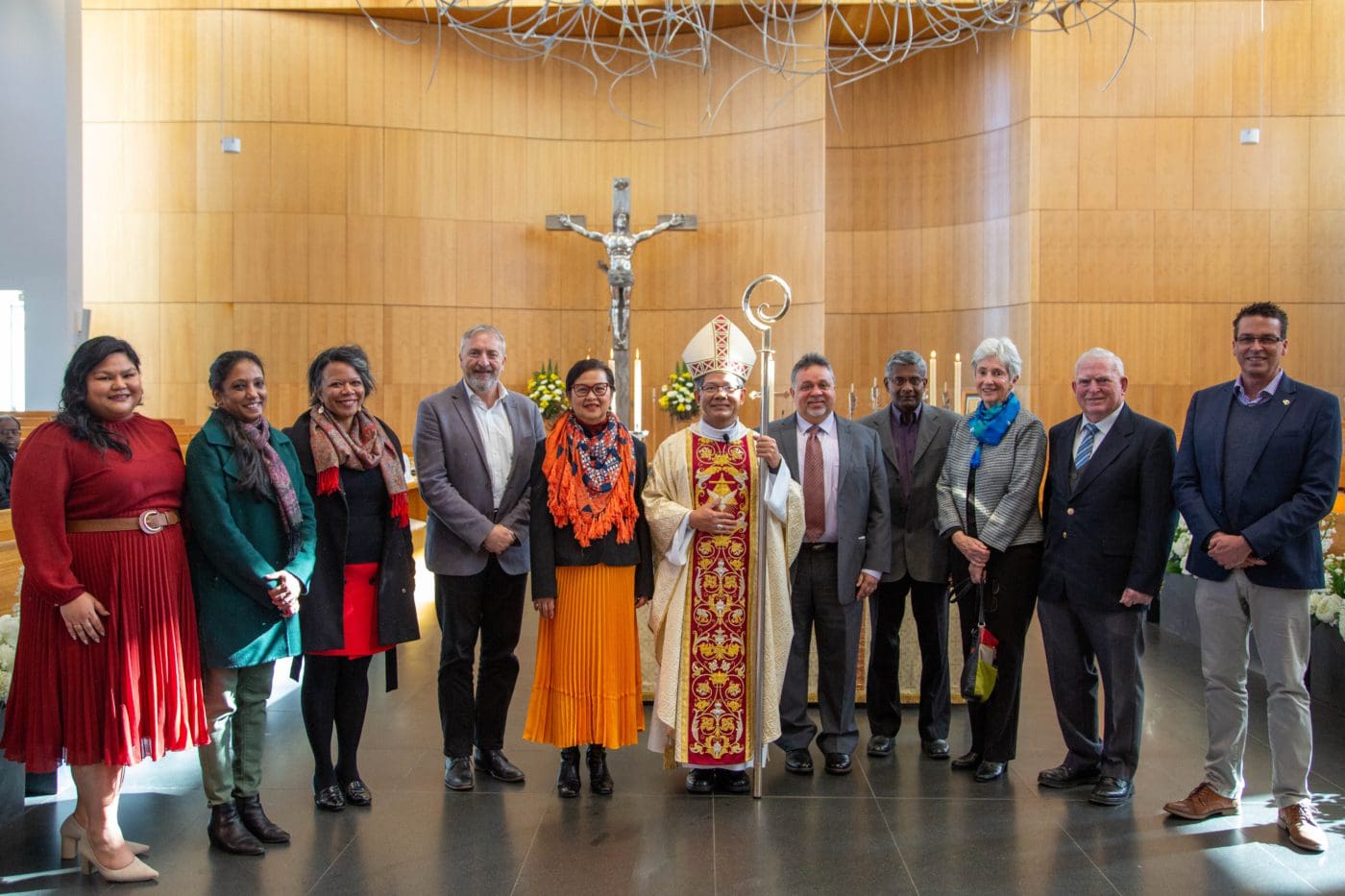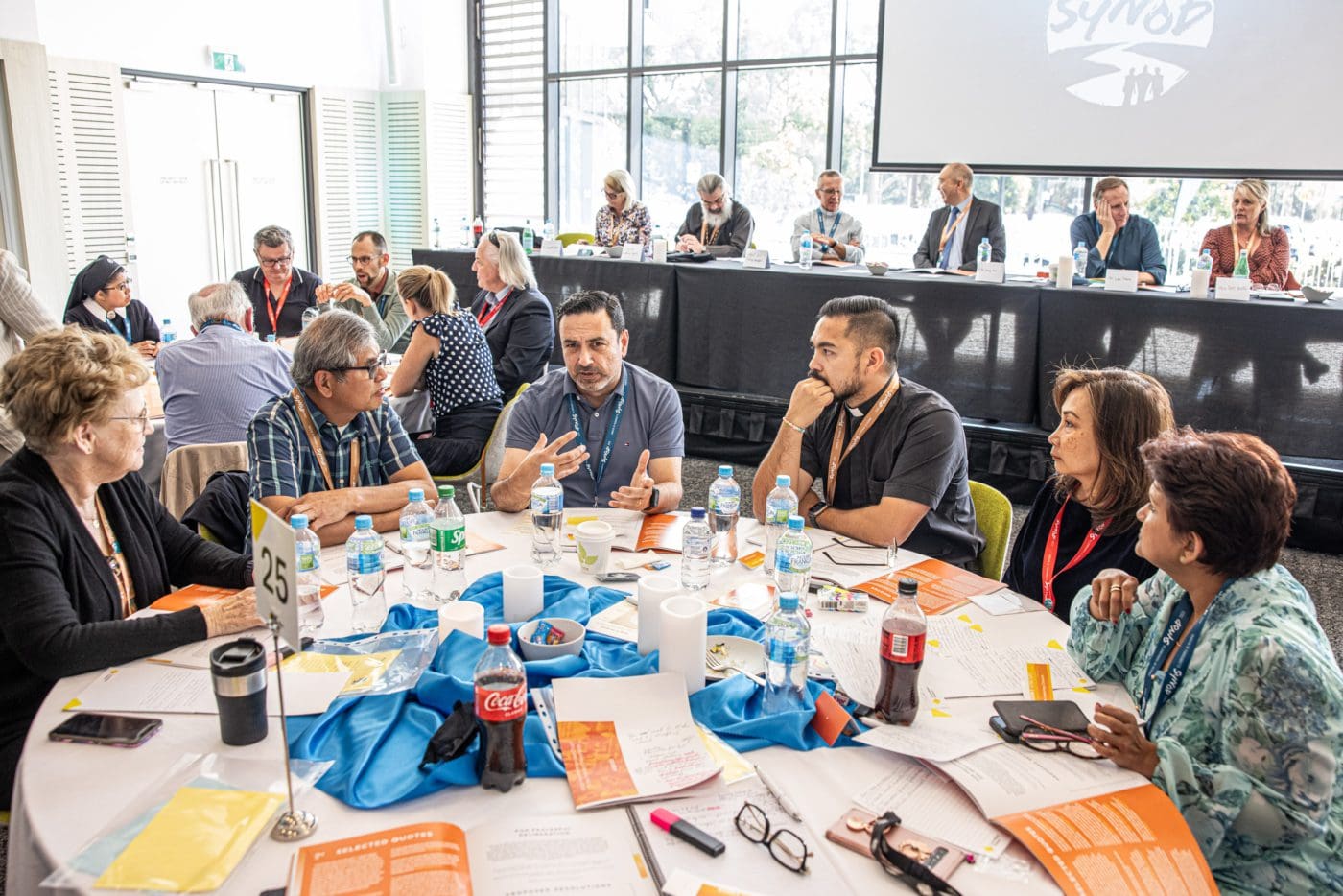Throughout the Diocese of Parramatta, there are opportunities to connect with our community and make a difference. Join one of our councils, boards or advisory committees and contribute your skills and leadership to the governance, guidance or growth of our faith community.
These councils and committees are typically composed of clergy, religious, and laity, and they play an important role in ensuring that each diocese is responsive to the needs of its people. Whether you’re passionate about charity work, the administration and running of the church, amplifying the voices and experience of young people, or looking after the spiritual well-being of our community, your experience and leadership can contribute to the mission of the church, and help ideas come to life.

Diocesan Pastoral Council
A Diocesan Pastoral Council is a consultative body that assists the Bishop in his pastoral ministry by providing advice, promoting communication among different groups in the diocese, and collaborating with other bodies on matters that concern the pastoral life of the diocese. In the Diocese of Parramatta, the Bishop consults with the Diocesan Pastoral Council to ensure that the Church is responsive to the needs of its people.
Deanery Pastoral Councils
The Diocese of Parramatta’s Deanery Pastoral Councils are representative bodies that act as a significant expression of the synodal church, sharing in the responsibility for the ongoing pastoral life of the local communities in the deanery*. Considering the pastoral questions of our day with their Dean, members listen to their communities and discern local needs, support the implementation of pastoral goals while fostering connection and communication throughout the deanery. There is one such council per deanery.
*Deaneries are small geographical groups of parishes within a Diocese, within which parishes are under the care of a Dean.


Parish Councils
Parish Councils are made of representatives from the parish community who share a common desire to serve their local church community. As a consultative group, the council assists the Parish Priest in his pastoral ministry by providing advice and recommendations on a variety of parish matters, such as engaging youth and young families, worship and evangelisation, service, or fundraising. If you are interested in joining your parish council, please contact your local church.
Governance Bodies
Board of Management
For the Diocese of Parramatta, the Board of Management plays a fiduciary function to act as a
steward for priests’ remuneration.
Catholic Care Western Sydney and the Blue Mountains Advisory Council
Catholic Care’s purpose is to provide professional care and support to the most vulnerable and disadvantaged members of the community, regardless of faith, religion, gender, ethnicity, age, ability, or socio-economic background. The Catholic Care Advisory Council ensures that Catholic Care has in place a contemporary and appropriate governance framework and acts in accordance with the policies of the Diocese of Parramatta.
Catholic Diocese of Parramatta Services Limited Board of Directors
The Board of Directors are responsible for the overall governance and strategic direction of an
organisation. They provide “overall superintendence” of a company, overseeing both performance and compliance by the organisation’s purpose and objectives.
Catholic Schools Parramatta Diocese Board of Directors
The Board of Directors are responsible for the overall governance and strategic direction of an
organisation. They provide “overall superintendence” of a company, overseeing both performance and compliance in accordance with the organisation’s purpose and objectives.
Clergy Support Foundation
The Clergy Support Foundation at the Diocese of Parramatta serves to provide support to the needs of the retired and unwell clergy of the Diocese.
College of Consultors
A body of priests appointed by the Bishop from the Council of Priests. The primary purpose is to be an advisory body to the Bishop on property, financial and any other matters of importance decided upon by the Bishop (Canon 502).
Council for Consecrated Life
The function of the body is to advise the Bishop on matters of religious life, to arrange gatherings of religious and to promote religious vocations.
Council of Priests
A representative body of priests who act like a senate together with the Bishop to assist him in
the governance of the Diocese and in his duty of pastoral care of the people of God (Canon 495).
Diocesan Audit, Risk and Compliance Committee
A standing committee of the Diocesan Finance Council. The DARCC assists with the oversight of financial statements and external reporting, legal and regulatory requirements, audit function, risk management and communication with regulators.
Diocesan Finance Council
Provides stewardship of the assets of the Diocese and is responsible for financial planning, budgeting, financial reports, audits, and financial risk. The DFC is also responsible for advice on
property matters, administration, investment, insurances, inventory, the development fund, legal
issues and the appointment of the Chief of Operations and Finance. This Council has three standing committees.
Diocesan Property Committee
A standing committee of the Diocesan Finance Council. The function of the Committee is to review and make recommendations to the Diocesan Finance Council to oversee and advise the Diocesan Trustees and Diocesan Finance Council about matters involving the use of any real property, including compliance and statutory requirements, vested in the Diocesan Trustees by civil law.
Diocesan Safeguarding Council
The Diocesan Safeguarding Council provides strategic and skilled guidance and advice to the Bishop and other relevant leaders including the Head of People & Culture regarding safeguarding children and vulnerable people in the Diocese. It also monitors policies, procedures, and practices safeguarding in the Diocese.
Diocesan Development Fund Investment Advisory Committee
Standing committee of the Diocesan Finance Council is the Diocesan Development Fund Investment Advisory Committee (IAC) which was established to govern the Diocesan Development Fund. The Investment Advisory Committee is responsible for the management of the Diocesan Development Fund.
The Diocesan Development Fund provides a source of finance and credit for capital expenditure in the works of the Church and provides funds for welfare and pastoral programs in the Diocese of Parramatta.
Diocesan Pastoral Council
The function of the Diocesan Pastoral Council is to consider matters concerning pastoral works in the Diocese and to propose practical conclusions. It is a conduit for communication between the Bishop and the people of each deanery. The Christian faithful makes up this Council and are selected in such a way that they truly reflect the entire portion of the people of God and reflects different areas of the diocese, social conditions and professions, and the role which they have the apostolate whether individually or joined with others (Canon 511 §2).
Deanery Pastoral Council
The role of the Deanery Pastoral Council is to share responsibility for the ongoing life and
development of the deanery in sharing of faith and growing faith in Christ, and to consider pastoral works in the diocese and propose practical conclusions by way of recommendations to the Bishop.
Interfaith and Ecumenical Commission
The Diocesan Interfaith Commission is tasked with ensuring that the Diocese continue the way to deeper interfaith dialogue and connection. The focus of the commission is on the promotion and understanding of interfaith dialogue through conversations, activities, presentations, and resources to encourage meaningful encounters with believers of different faith traditions.
Liturgical Commission
The Diocesan Liturgical Commission exists to assist in developing processes for liturgical life and practice in the Diocese. The Commission also provides direction for diocesan liturgical celebrations.
Parish Finance Committee
Canon law requires a finance committee to assist the parish priest in the administration of the temporal goods of the parish.
The Finance Committee is a collaboration between parishioners and the parish priest in this administration.
Parish Pastoral Council
The function of the body is a consultative/advisory Council with broad functions to support the work of the parish. It is an explicit call to synodality. It does not have any formal governance function; however, the pastor must consider proposals attentively, especially if they are unanimous
Personnel Board
The Personnel Board of the Diocese has the purpose of advising the Bishop concerning pastoral assignments. In doing so, members of the Board assist the Diocesan Bishop and the priests and deacons of the Diocese in their mutual relationships relative to placement. Thus, the Board serves to promote the welfare of both the priesthood and the people they serve.
Seminary Finance Committee
Canon 1276 spells out the responsibility of the Bishop in a supervisory role overseeing the administration of all goods which belong to a Seminary in the Diocese.
The Seminary Finance Committee advises the Rector and Bishop on any financial policies and the financial situation of the Seminary.
Trustees of the Roman Catholic Church for Diocese of Parramatta
Churches and Parishes are voluntary unincorporated associations in the eyes of civil law. To facilitate the administration of the property held for the purposes of these unincorporated associations, the parliament has passed statutes for the establishment of trustees to hold real property. The Catholic Church’s Code of Canon Law requires that ownership ecclesiastical goods be safeguarded in ways that are valid in civil law. It follows that church entities should be established in a way that their property and activities will be recognised in civil law. This is achieved by the incorporation of a trustee to hold assets and enter into contractual arrangements on behalf of the church body.
To find out more about joining one of the Diocesan councils or advisory committees, please complete the form below:

